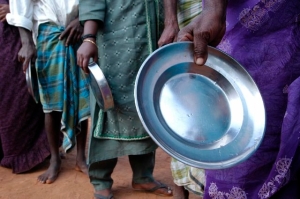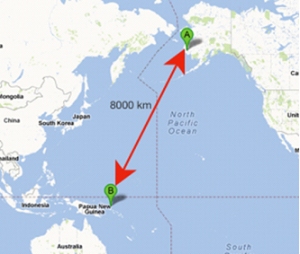Archive
Community Leaders Meet to Discuss Relocation in the Face of Climate Change
By Alyssa Johl and John Crump*
This week, community leaders from two small villages in very different parts of the world will meet on Bougainville Island in Papua New Guinea (PNG) to discuss a common problem: their need to relocate as a result of climate change. The communities of Newtok, Alaska, and the Carteret Islands, Papua New Guinea, are among the first in the world to choose relocation as the best means of adapting to the effects of a changing climate and ensuring their cultural survival. Read more…
Rio+20 Outcome: The Anthropocene Challenge
By Marcos Orellana, Rio de Janeiro (originally posted 22 June 2012)
On June 20, the United Nations Conference on Sustainable Development (Rio+20) officially started in Rio de Janeiro, Brazil. The Conference opened with a documentary, Welcome to the Anthropocene, which was introduced by the UN’s Secretary-General. The documentary visually portrays the alteration in Earth’s natural cycles induced by human activities.
Welcome to the Anthropocene echoes the United Nations Environment Program (UNEP) 5th edition of the Global Environmental Outlook (GEO-5), published on June 6, 2012. The report concludes that the “scientific evidence shows that Earth systems are being pushed towards their biophysical limits.” Also it “cautions that if humanity does not urgently change its ways, several critical thresholds may be exceeded, beyond which abrupt and generally irreversible changes to the life-support functions of the planet could occur.” Read more…
UN Human Rights Council establishes an Independent Expert on Human Rights and the Environment
 CIEL and Earthjustice, working closely with Maldives, Costa Rica and Switzerland, obtained from the UN Human Rights Council a resolution on Human Rights & Environment that establishes an Independent Expert on Human Rights and the Environment. Read more…
CIEL and Earthjustice, working closely with Maldives, Costa Rica and Switzerland, obtained from the UN Human Rights Council a resolution on Human Rights & Environment that establishes an Independent Expert on Human Rights and the Environment. Read more…
Great Rainforest or the Greatest Rainforest?
By Amanda Kistler
 On Thursday, January 12th, 2012 CIEL scientist Matt Finer presented as part of Amazon Watch’s GreenBag Lunch series with this auspicious title, riffing off Stephen Colbert’s rhetorical question he poses to anyone that might not agree with his hyperbolic categorization. However, even Colbert would find few, if any, who would call the region of Loreto, Peru, anything but great
On Thursday, January 12th, 2012 CIEL scientist Matt Finer presented as part of Amazon Watch’s GreenBag Lunch series with this auspicious title, riffing off Stephen Colbert’s rhetorical question he poses to anyone that might not agree with his hyperbolic categorization. However, even Colbert would find few, if any, who would call the region of Loreto, Peru, anything but great
According to Matt, Loreto is a huge land area but not unmanageable. It is primarily flat except for the western areas that are the last bit of lowland forest before the Andes Mountains. Endemic species, or species that cannot be found anywhere else, live in these elevation gradients. Loreto is also home to the start of the Amazon River. Read more…
It’s time to admit there is no future in fossils.
By Niranjali Amerasinghe
Following the UN climate talks in Durban can be a tedious business. Even for a conference junkie like me. There are times when the discussions get so mired in petty political bargaining that it’s hard to keep the bigger picture in mind. People seem to forget why they’re actually there: to find a solution to the biggest environmental threat ever faced by humanity. This involves making significant changes to the status quo, like transitioning away from fossil fuels to cleaner sources of energy. There is no way we will limit global warming to 1.5oC degrees Celsius (a level above which impacts from climate change are expected to be radically more extreme) if governments continue to pander to the special interests of the fossil fuels industry. Read more…
What’s at stake at Durban? We are.
By Kristen Hite, Interim Director, Climate Change Program
 In recent years we’ve seen global predictions on climate change becoming increasingly dire. In recent weeks it’s gone from bad to worse: The International Energy Association, often criticized for how its future projections of energy production rely too heavily on fossil fuels and nuclear energy just issued a report that says our current energy patterns will lead us to a global rise in temperature of 4 degrees Celsius or worse, leading to “irreversible and potentially catastrophic climate change.” This comes on the heels of a new analysis by the Intergovernmental Panel on Climate Change (IPCC), which tells us that impacts are worse than expected and that climate change is increasingly responsible for natural disaster damages to the tune of billions of dollars annually. Put simply: we can’t avoid climate impacts—we’re already experiencing them and they are getting worse. But we can avoid locking in an unsustainable future that guarantees widespread destruction to communities and ecosystems across the globe—that is, if diplomats representing 190+ countries agree on how to act. Read more…
In recent years we’ve seen global predictions on climate change becoming increasingly dire. In recent weeks it’s gone from bad to worse: The International Energy Association, often criticized for how its future projections of energy production rely too heavily on fossil fuels and nuclear energy just issued a report that says our current energy patterns will lead us to a global rise in temperature of 4 degrees Celsius or worse, leading to “irreversible and potentially catastrophic climate change.” This comes on the heels of a new analysis by the Intergovernmental Panel on Climate Change (IPCC), which tells us that impacts are worse than expected and that climate change is increasingly responsible for natural disaster damages to the tune of billions of dollars annually. Put simply: we can’t avoid climate impacts—we’re already experiencing them and they are getting worse. But we can avoid locking in an unsustainable future that guarantees widespread destruction to communities and ecosystems across the globe—that is, if diplomats representing 190+ countries agree on how to act. Read more…
MESSAGE TO OBAMA: FREE AMERICA from the tyranny of oil
After six days and 322 arrests (and counting), the Tar Sands Action is in full effect. This two-week long protest is being staged on the sidewalk in front of the White House in Washington, DC, plainly visible to government employees, diplomats and tourists alike. Concerned citizens have travelled from all 50 states and Canada to send a direct message to President Obama and the U.S. State Department: Stop the construction of TransCanada’s Keystone XL pipeline, which would transport crude oil from Alberta’s tar sands to Gulf Coast refineries. The tar sands extraction process requires massive amounts of energy and water, and results in about three times the amount of greenhouse gas emissions as conventional oil. In his Washington Post op-ed, Bill McKibben provides more information on the pipeline and its environmental impacts, and describes why this act of civil disobedience is so critical. Read more…
The “New Normal”: Food in the 21st Century
By Baskut Tuncak
 The global food system is broken. Worldwide, 925 million are undernourished. The Asia-Pacific region ranks highest in terms of number of people that are hungry and sub-Saharan Africa leads on a percentage basis. In Niger, for example, one in two children suffers from malnutrition and one in six dies before the age of five. In July of 2011, the UN declared Somalia’s food crisis a famine, triggered by the country’s worst drought in 60 years, killing tens of thousands of Somalis from malnutrition-related causes and forcing mass exodus to neighboring Kenya. Aid agencies estimate that 3.7 million people in Somalia and millions more in neighboring Djibouti, Ethiopia and Kenya are close to starvation.
The global food system is broken. Worldwide, 925 million are undernourished. The Asia-Pacific region ranks highest in terms of number of people that are hungry and sub-Saharan Africa leads on a percentage basis. In Niger, for example, one in two children suffers from malnutrition and one in six dies before the age of five. In July of 2011, the UN declared Somalia’s food crisis a famine, triggered by the country’s worst drought in 60 years, killing tens of thousands of Somalis from malnutrition-related causes and forcing mass exodus to neighboring Kenya. Aid agencies estimate that 3.7 million people in Somalia and millions more in neighboring Djibouti, Ethiopia and Kenya are close to starvation.
UN Security Council Misses Critical Opportunity to Take Action on Climate Change
By Alyssa Johl and Hana Heineken
At the end of Wednesday’s Security Council open debate on the security implications of climate change, Council members reached consensus on a Presidential Statement recognizing the link between security and climate change (see our July 19 blog for background on this issue). While this statement fails to call for any specific actions to be taken by the Council, it is notable for several reasons. It recognizes the relationship between climate and security, particularly with respect to sea level rise, identifies that climate change may be a “threat multiplier”, and stresses the need for international cooperation to address climate change, including its security impacts. Read more…
UN Security Council Debates the Security Implications of Climate Change
By Erica Woodruff
Tomorrow, the UN Security Council will host an open debate on the international peace and security implications of climate change. CIEL’s Hana Heineken will be attending and tweeting live from the debate (follow Hana’s updates @ciel_tweets).
While most people think of global warming as an environmental issue, the climate crisis is expected to have far-reaching impacts on peace and security, especially in developing countries that do not have the capacity to adapt. Rising sea levels, increasing storm surges and other climate impacts will contribute to economic destabilization, social unrest, resource competition, and migration flows that are root causes of conflict both within and among nations (for this reason, climate change has been labeled a “threat multiplier” in a 2007 report written by senior U.S. military leaders).





